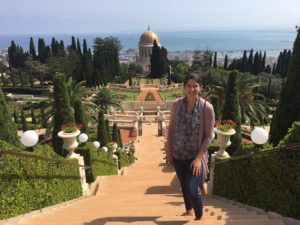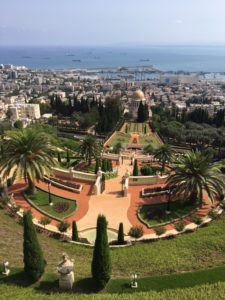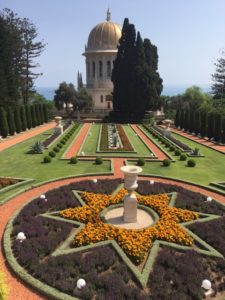
On Friday, I jumped at the chance to travel to Haifa, a port city in northern Israel, to learn more about the Baha’i, a religious minority group often overlooked in discussions concerning the religious landscape of this region. With all of the hype about the Holy Land as a place for Jews, Christians, and Muslims, it can be easy to miss the larger more complicated mosaic of religious and ethnic diversity at work here.
I was allowed to enter and tour the Baha’i gardens which cut straight down through the middle of the downtown of Haifa from the top of the Mount Carmel to the Mediterranean Sea. The Baha’i religion originated in the mid-19th century in Iran with the message and thinking of the Bab. Persecuted and killed for his views, his body was eventually brought to Haifa and interred in a mausoleum in the gardens. One of his followers, Baha’u’llah, became the prophet and founder of the tradition, escaping persecution in Iran only to be imprisoned in Acre (Acco), a port city facing Haifa. From his prison cell, Baha’u’llah could look through his window across the sea towards a beautiful hillside in Haifa. This hill–having no religious significance to any other monotheistic tradition with a presence in the region- was easily purchased at a cheap price. This hill became the site of the Baha’i gardens where Bab was buried–the second holiest site for the Baha’i after the tomb of Baha’u’llah in Acre.

The Baha’i are monotheistic and believe that Christians, Muslims, and Jews all worship the same God. However, Baha’u’llah believed that the reason for infighting amongst all these monotheists stemmed from each of their holy books, whether the Hebrew Bible, the New Testament, or the Qur’an. Monotheists needed to leave behind these texts and focus on worshiping one common God instead.
This religion was truly progressive for its time. Baha’u’llah called for an end to all forms of religious discrimination and full equality between the sexes along with the elimination of extreme poverty and wealth. While the religion has not incorporated equality measures for gays, lesbians, and transgender persons, this tradition was already more inclusive at the turn of the century (and still is) than many Christian traditions that I am familiar with, such as Catholicism and many Protestant sects. After the death of the two founders, there have been no religious leaders comparable to priests or imams, etc. for fear that such leaders might try to “limit the word of God.” You cannot be born into the Baha’i tradition; at the age of 15, you decide which religious tradition to join and there is support even if you decide not to become Baha’i or do not marry a fellow Baha’i.

Currently there are between 700-1,000 Baha’i volunteering in Israel (on limited duration visas since they cannot apply for citizenship). They come to volunteer in the garden or at the other holy sites. The cost for the upkeep of these impressive gardens is fully funded by Baha’i members. They take no outside donations. When one decides to become a Baha’i, the member must start paying a percentage of their salary as well as committing to volunteer work–at these holy sites and in philanthropy efforts worldwide.
The Baha’i volunteer I spoke with who was working at the entrance of the shrine said she enjoys prayer and meditation both within the shrine and throughout the gardens. She explained that Baha’i hold group gatherings of worship every 19 days but not within the shrine itself, again so no one leading worship would risk “limiting the word of God” through their interpretation. There are also no holy  objects within the shrine itself since it is just a place for personal prayer and meditation. There are beautiful statues of peacocks and hawks as well as star patterns throughout the gardens but these have no religious significance. The Baha’i emphasize beauty through symmetry as a means of preparing oneself for prayer. They do pray in the direction of Acre, where the prophet Baha’u’llah is buried.
objects within the shrine itself since it is just a place for personal prayer and meditation. There are beautiful statues of peacocks and hawks as well as star patterns throughout the gardens but these have no religious significance. The Baha’i emphasize beauty through symmetry as a means of preparing oneself for prayer. They do pray in the direction of Acre, where the prophet Baha’u’llah is buried.
There are 8 million Baha’i world wide, most living in India, as well as in over 200 other countries–except for Israel! Despite the fact that the two holiest religious sites for the Baha’i are in Haifa and the nearby port city of Acre, Baha’u’llah did not want Baha’i followers to settle in the Holy Land, a dictate which has continued to this day. When I asked the Baha’i young women the reason behind this decision, she explained that the while the Baha’i see this as the common Holy Land for all monotheistic religions, the Baha’i do not want to “occupy the land or get in the way”–a refreshing perspective on how to view this land which remains special and sacred to so many religious persons around the world. The Baha’i hope is for “all to live in peace and harmony”.